Exploring Diverse Macaw Breeds and Their Care
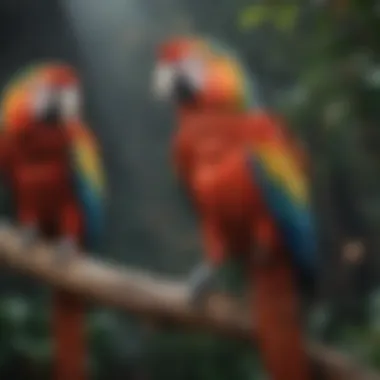
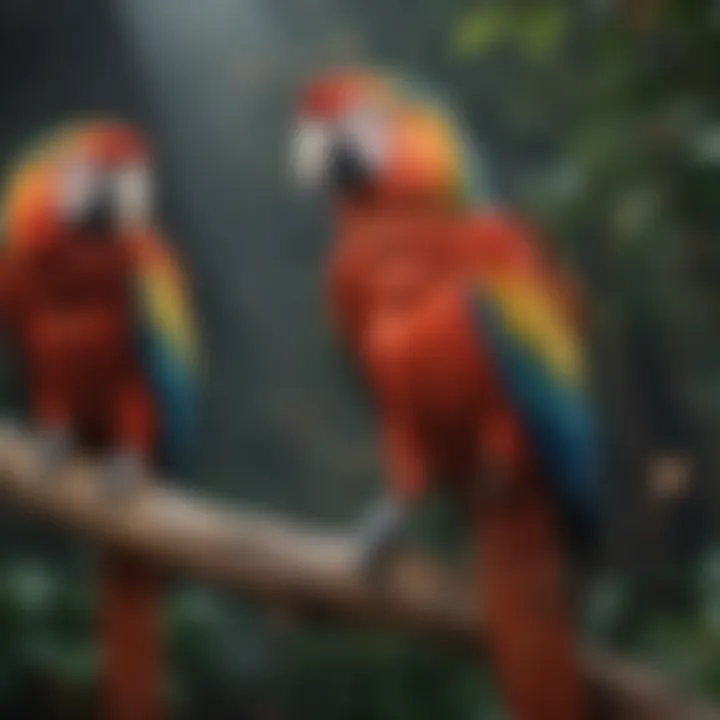
Intro
Macaws are not just colorful birds; they are intelligent beings with intricate personalities. Their vibrant feathers, ranging from brilliant blues to vivid reds, can captivate anyone at first sight. Owning a macaw is akin to welcoming a larger-than-life character into your home, one that demands attention and love. This article will guide you through the unique world of macaw breeds, emphasizing the importance of understanding their specific needs and behaviors. Whether you are a seasoned bird enthusiast, a potential pet owner, or a bird breeder, this comprehensive examination will provide valuable insights into caring for these avian companions.
Understanding macaws goes far beyond appreciating their beauty. It's essential to recognize their specific care requirements, diet, and social nature. Each breed has its quirks and charms which are crucial for prospective owners to learn about to foster a harmonious relationship.
Let’s begin this journey by exploring some essential care tips that will set the foundation for a thriving environment for your macaw.
Care Tips
Daily Care Routines
Caring for a macaw involves more than just feeding and cleaning. Their daily routines should engage their minds and bodies. Start the day by offering fresh water and a nutritious breakfast, catering to their specific dietary needs. Incorporating playtime early in the day can help set a positive tone. Dedicate time to out-of-cage interactions to allow them to stretch their wings and socialize. Ensure they have a stimulating environment filled with toys that challenge their intelligence, as boredom can lead to behavioral issues.
Cage Setup and Maintenance
A macaw's cage is their home, and it should reflect their need for space and enrichment. Opt for a spacious cage where they can move freely—consider models such as the A&E Cage Company Double Macaw Flight Cage. It's wise to position the cage in a lively area of the home where they can see family activity, as macaws thrive on social interaction. Regular maintenance is vital; performing weekly cleanings will help prevent diseases and keep their environment sanitary.
Hygiene and Cleaning Practices
Maintaining hygiene is critical for your macaw’s health. Daily inspections for droppings and spilled food should become part of your routine. Moreover, provide opportunities for baths—whether through misting, a shallow dish, or an outdoor spray in warm weather—as clean feathers contribute to overall well-being.
Seasonal Care Adjustments
As seasons change, so must your care strategies. In colder months, ensure they are kept warm and away from drafts. A temperature-controlled environment can stave off illnesses during chilly nights. Conversely, in the heat of summer, provide ample shade and fresh water, since macaws are also prone to overheating.
"Understanding a macaw's environmental needs through seasonal care adjustments is crucial for their overall health and happiness."
Behavioral Insights
Understanding Bird Body Language
Every bird owner quickly learns that communication with their feathered friend goes beyond mere vocalization. Macaws have distinctive body language. Observe head movements, wing positions, and tail spread. A relaxed bird might hang upside down, signaling comfort and playfulness. Conversely, a puffed-up bird often indicates discomfort or stress. Learning these cues helps foster a deeper connection.
Common Behavioral Issues and Solutions
Like any pet, macaws can exhibit behavioral problems such as excessive screeching or biting. Identifying triggers for these behaviors is essential. For instance, if a macaw screams for attention, developing a schedule where they receive consistent interaction can help. Addressing behavioral challenges with patience and understanding can smoothen your bond.
Positive Reinforcement Techniques
Using treats and praise is more effective than punishment—for instance, when your macaw learns a new trick, reward them with a favorite treat. Positive reinforcement encourages good behavior and strengthens the human-bird relationship.
Social Interaction Needs
Macaws are highly social creatures and thrive on interaction. Regular playdates with other birds or simply spending time with human companions are critical. Isolation can lead to loneliness and behavioral issues, so consider making time for daily socialization.
Nutrition Guides
Essential Diet Components
Feeding a macaw isn’t just about tossing seeds in a bowl; it's a careful balance of nutrients. A diet mainly consisting of fresh fruits, vegetables, and high-quality pellets—such as those from Harrison's or Kaytee brands—should form the backbone of their nutrition. These products are formulated to meet their specific dietary needs.
Safe and Toxic Foods
Not everything is safe for your feathered friend. Certain foods, like avocado, chocolate, and caffeine, are toxic to macaws. Familiarize yourself with a list of safe foods and always err on the side of caution when introducing new items to their diet.
Supplements and Treats
Every so often, supplemental vitamins or occasional treats can be beneficial. Nuts and seeds in moderation can work as perfect training rewards. Just remember, treats should complement their diet and not outweigh it.
Feeding Strategies for Different Species
Different macaw breeds have varied dietary needs. For instance, the Blue and Gold Macaw may require a different balance of vitamins and minerals compared to the Scarlet Macaw. Tailoring their diet according to their species enhances health and vitality.
Wellness and Health
Routine Health Checkups
Regular vet visits are essential in ensuring your macaw’s health. A specialized avian vet can spot potential issues early, which is key to prevention. Annual health screenings should be part of your routine.
Identifying Symptoms of Illness
Learn about the signs that suggest something is amiss. For example, be vigilant for changes in droppings, feathers, or appetite. Early identification is crucial, as macaws often hide their illnesses until they escalate.
Preventative Care and Vaccinations
Ensure your macaw is up-to-date on vaccinations. Preventative care steps, including proper diet, regular exercise, and social interaction, create a solid foundation for a healthy, long life.
Mental and Emotional Well-being
Mental health is as crucial as physical health. Ensuring your macaw has various activities and interactions keeps their minds sharp and emotions stable. Always look for signs of distress or boredom.
Enriching Activities
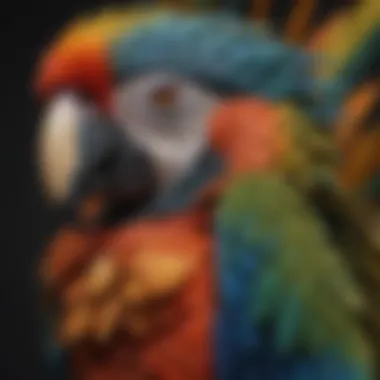
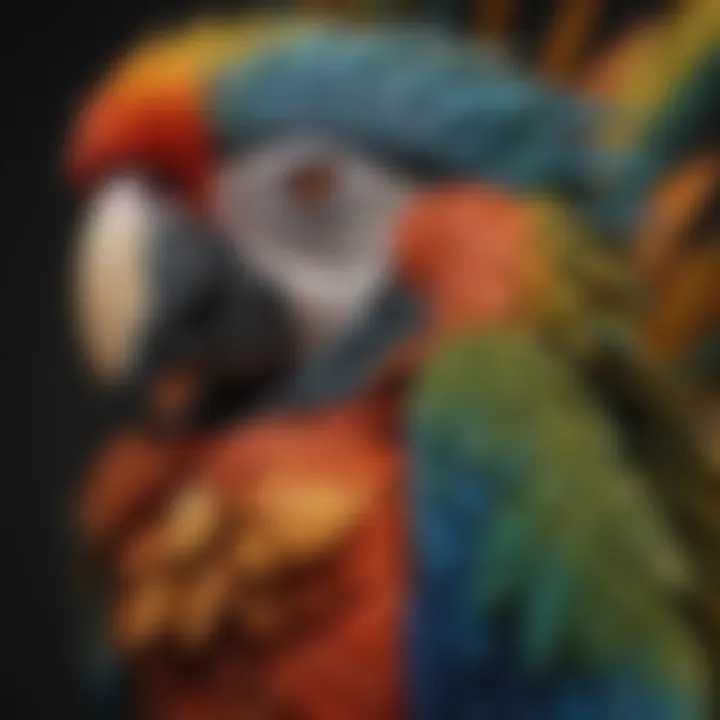
Toys and Playtime Ideas
Providing a range of toys—from foraging toys to interactive puzzle feeders—can stave off boredom and keep your macaw happily occupied. Consider options from reputable brands like Zuperzozial.
Training and Tricks
Teaching tricks not only entertains but also enhances your bond. Start with simple commands and gradually move to more complex behaviors. Keeping training sessions consistent and rewarding helps in the learning process.
Outdoor Activities and Interaction
When the weather permits, let your macaw enjoy the great outdoors. Using a safe carrier or harness allows them to experience new sights and sounds, which can stimulate their senses and improve well-being.
DIY Projects for Mental Stimulation
Consider creating your own toys or puzzles to keep their minds engaged. Simple projects using household materials can turn into stimulating experiences for your macaw. It also offers a fun bonding opportunity for both of you.
As we move through this article, prepare to deepen your understanding of the various macaw breeds and enhance your experience as a bird owner. In the following sections, we will further dissect their unique traits, behaviors, and care requirements.
Foreword to Macaw Breeds
When we step into the enchanting world of macaws, it’s not just about vibrant colors and amazing personalities. Understanding the various breeds of macaws holds immense significance, especially for those who appreciate these birds or are considering bringing one into their home. Each breed boasts its own set of behaviors, colors, and needs that can greatly influence the ease of ownership and the joy these birds can bring to one's life.
Defining Macaws
Macaws are large, long-tailed birds from the parrot family, known scientifically as Psittacidae. They generally hail from the tropical forests of Central and South America. Their size is notable, with some species like the Hyacinth Macaw reaching lengths of over three feet, making them truly impressive creatures. Macaws are characterized by their striking plumage, with bright and varied colors such as blue, green, red, and yellow. Additionally, their strong beaks enable them to crack nuts and seeds, which are staple foods in the wild.
These birds are often social in nature, forming strong bonds with their companions—whether human or feathered. A macaw’s diet in the wild consists primarily of fruits, nuts, and seeds, contributing to their necessity for a well-balanced diet in captivity. Understanding their definition extends beyond mere taxonomy; it involves appreciating their role in the ecosystem and the responsibilities that come with macaw ownership.
The Significance of Breed Knowledge
Knowing the specific breeds of macaws is essential for several reasons. Each breed has its personality traits and requirements that can affect everything from housing to diet and social interaction. For instance, Blue and Gold Macaws are often recognized for their affable nature, while Scarlet Macaws might exhibit a more fiery temperament.
Getting familiar with each breed enables potential owners to select a macaw that aligns with their lifestyle. Here are some key considerations:
- Behavioral Needs: Different breeds may require varying amounts of social interaction. Some may crave constant companionship, while others might be more independent.
- Space Requirements: Larger breeds, like the Hyacinth Macaw, will need a proportionally larger cage and space to fly.
- Lifespan Differences: Some macaws can live up to 60 years or more. Knowing this is crucial for anyone looking to own such a long-term companion.
Macaws are not merely pets but intelligent companions that require considerable input in terms of time and care. Therefore, understanding the breeds is paramount to ensuring that both the owner and bird thrive in their relationship.
"The more you know about each breed, the better prepared you are to meet their needs and enhance your experience with them."
In this article, we will delve deeper into these aspects, exploring the rich tapestry of macaw breeds that inhabit our world, and ultimately guiding prospective owners in their quest for knowledge and understanding.
Physical Characteristics of Macaws
Understanding the physical characteristics of macaws is essential not just for those who may be looking into bringing one of these bright creatures into their home, but also for bird enthusiasts and breeders alike. These characteristics can reveal a lot about the health, temperament, and even the suitability of a particular breed for captivity. Macaws boast a variety of colors, sizes, and body structures that reflect their diverse habitats and lifestyles. Grasping these features provides valuable insights into how best to care for them, ensuring they thrive in a home setting.
Coloration and Patterns
Macaws are often recognized for their stunning plumage, a true feast for the eyes. The vibrant colors are not merely for show; they have evolutionary significance too. Bright feathers can play a role in attracting mates and also help in camouflage amid the colorful leaves and fruits of tropical rainforests.
Each breed flaunts its unique color palette. The Blue and Gold Macaw showcases a beautiful contrast with its rich blue wings and bright yellow underbelly. The Scarlet Macaw, on the other hand, is dressed in vivid red with hints of blue and yellow—akin to a painter’s bold brushstrokes.
Feather patterns can also signify health and well-being. For instance, an uneven color distribution or dull feathers may suggest nutritional deficiencies or illness. Observing these patterns can be telling, hence, fostering a bond between owner and bird is deeply interconnected with understanding these physical traits.
"Color is the keyboard, the eyes are the harmonies, the soul is the piano with many strings." -Wassily Kandinsky
Size and Structure
When it comes to size and structure, macaws are some of the largest parrots, and their size alone demands specific care considerations. For example, the Hyacinth Macaw, the largest of the species, can reach lengths of up to 3.3 feet, including its long tail. Its wingspan can stretch comfortably over 4 feet, making it a truly impressive sight. Despite their grandeur, it’s crucial to note that their size isn’t just a physical trait; it influences their behavior, space requirements, and dietary needs.
The overall structure of macaws is designed for their lifestyle in the wild. With strong beaks suited for cracking nuts and a robust body for twisting and climbing, they are built for living in the trees. However, when housed in captivity, prospective owners must ensure that the environment mimics these natural settings as closely as possible.
Key Points to Remember :
- Plumage Colors: Each species has specific coloration that serves multiple purposes in the wild.
- Health Indicators: Feather quality often reflects the bird’s health.
- Size Variance: Larger macaws require more space and resources.
In summary, the physical characteristics of macaws are much more than mere aesthetics. They provide insight into the bird’s needs and behaviors, which is crucial for those ready to welcome this magnificent creature into their life.
Behavioral Traits of Macaws
Understanding the behavioral traits of macaws is vital for anyone interested in these magnificent birds. It helps owners to adapt their care strategies, ensuring that they provide a nurturing environment that caters to the birds’ natural instincts. Moreover, it enables potential owners to grasp the commitments involved in raising a macaw, leading to a more fulfilling relationship between human and bird.
Social Interaction
Macaws are inherently social creatures. In their natural habitat, they live in large flocks and have complex social structures. Such a background influences their behavior in captivity, making it crucial for owners to provide ample opportunities for interaction. The social interaction among macaws can be fascinating, marked by affectionate displays such as preening and touching. They often form strong bonds with both their human caregivers and other birds, which can result in joyous companionship.
Owners should be mindful of the macaw's need for social stimuli. Regular engagement, whether through play, verbal interaction, or shared activities, is essential for their mental well-being. A macaw left alone for extended periods may experience stress or develop behavioral issues.
To summarize, fostering social connections with a macaw can enrich both the bird's life and the owner's experience. Consider these tips for enhancing social interaction:
- Daily Playtime: Schedule time for one-on-one activities such as toys, training, or simple conversation.
- Multiple Birds: If feasible, consider getting another macaw. Companionship among birds can fulfill their social requirements.
- Community Involvement: Engage with local bird clubs or online forums like reddit.com where you can share experiences and gain insights from fellow macaw enthusiasts.
Vocalization Patterns
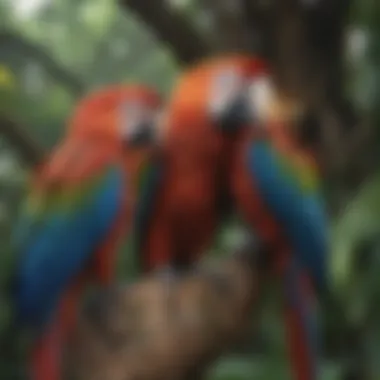

Vocalization in macaws is an essential aspect of their behavior, serving both communicative and expressive functions. These birds are known for their loud, distinctive calls, which can be quite a spectacle in a home environment. It’s important to note that vocalization is not merely noise; it carries meaning and can indicate a range of emotions and needs.
For instance, prolonged squawking may signal boredom or a desire for attention, while softer vocalizations often express affection or comfort. Owners must learn to interpret these sounds to respond appropriately, thereby enhancing the bond with their feathered companion. Additionally, macaws are quite mimicrical, often imitating human speech or household noises.
Here are a few noteworthy points regarding vocalization patterns in macaws:
- Understanding Frequency: Some macaws may vocalize more than others, meaning it's essential to match their needs with the owner's lifestyle.
- Training: Encouraging positive vocalization through training can help shape their sound repertoire in a productive manner.
- Environment Impact: The environment can influence how frequently and loudly a macaw might call. Ensure that their surroundings are stimulating to reduce excessive noise.
"Understanding vocalization patterns is like cracking the code of communication with your macaw—each chirp and squawk is a glimpse into their world."
Popular Macaw Breeds
Understanding the various macaw breeds is essential for anyone diving into the rewarding journey of macaw ownership. Each breed comes with its own traits, appearance, and personality that make them unique. Fostering a proper relationship with these birds requires knowledge of their needs and behaviors, making it pivotal to highlight some popular breeds. Selecting a certain breed can influence factors like housing requirements, socialization needs, and overall care complexities.
Some important aspects to consider are:
- Personality traits: Different species have varying temperaments, which can affect their compatibility with owners and other pets.
- Size: The dimensions of your chosen macaw affect housing space and appropriate care setups.
- Lifespan: As companions, macaws can live several decades, making long-term commitment vital.
Having a clear understanding of the popular macaw breeds can make all the difference in ensuring a fulfilling experience.
Blue and Gold Macaw
The Blue and Gold Macaw is among the most recognized species due to its striking coloration and playful demeanor. With bright blue feathers on its back, contrasting with vibrant yellow on its underbelly, this macaw is not just a feast for the eyes but a treasure in terms of personality. They are known for being quite affectionate and are often regarded as ideal for first-time macaw owners. Their intelligence makes them trainable, but they require consistent mental stimulation, otherwise, they can get bored and exhibit unwanted behaviors.
Scarlet Macaw
The Scarlet Macaw is like a walking piece of art, flaunting a blend of deep red, yellow, and blue feathers. Their charisma leads them to be sought after as pets. However, their loud calls can sometimes be a challenge in quieter households. In the wild, they have a social nature, often seen flying in pairs or flocks. For owners, this breed necessitates ample time for interaction to keep them mentally engaged and to maintain their happy disposition.
Green-Winged Macaw
A Green-Winged Macaw is distinguished not just by its lush green feathers, but also by a large, playful personality. They possess the intelligence of other macaws and can be quite vocal. These beauties tend to develop strong bonds with their humans, often requiring a robust presence in their owners' lives. Just as friendly as they are intelligent, they also do well with social gatherings; being well-adjusted can take some time and patience.
Hyacinth Macaw
The Hyacinth Macaw is the largest of all macaw species, and it makes a statements wherever it goes. Its sheer size and striking cobalt blue plumage can draw attention easily. These birds are generally more gentle and shy than their more boisterous cousins, but they still require similar amounts of care and socialization. They are also a bit more specialized when it comes to diet, often needing higher fat content in foods like nuts. Their long lifespan means that their owners create lasting bonds.
Severe Macaw
Severe Macaws, often overlooked, pack a lot of personality into their smaller frames. Their feathers are primarily green with unique touches of yellow and blue, creating a visually appealing look. They are known for their energetic nature, bringing a lively atmosphere to any home. While affectionate, they can also develop strong preferences toward a single person. Their curiosity can lead to playful mischief, so staying vigilant while they explore their surroundings is wise.
Understanding the characteristics of these popular macaw breeds not only enhances the relationship with these birds but also ensures that their specific needs are met, leading to a rewarding experience for both birds and their owners.
Care Guidelines for Macaw Owners
The responsibility of being a macaw owner involves more than simply providing a colorful bird in your home; it requires a solid understanding of their care. By diving into the essential care guidelines, owners can foster a dynamic relationship that not only benefits their macaws but also enhances their own experience as bird enthusiasts.
Macaws are social animals with complex needs. Thus, knowing how to maintain their habitat, diet, and overall health is crucial for their well-being. This section will explore the key areas of focus for any potential or existing macaw owners.
Optimal Housing Conditions
Choosing the right housing for a macaw is akin to selecting a home; it should be spacious, safe, and stimulating. These gentle giants require ample space to spread their wings and engage in natural behaviors. A good starting point for cage size is at least 3 feet wide by 5 feet long, with a similar height. The cage should have sturdy bars, at least 1 inch apart, to prevent the bird from escaping or getting stuck.
When setting up the cage, make sure it is located in a main living area. Macaws thrive on interaction and do not appreciate being isolated. The interior should include a variety of perches made from different materials to maintain their foot health. Ropes, natural wood branches, and even platforms can be included for diverse experiences.
Moreover, the habitat should be enriched with toys. This not only keeps them entertained but also encourages them to use their beaks and minds. Chewing is a natural behavior, so make sure they have safe items to gnaw on. Adding some safe plants can also add extra greenery and support their mental well-being.
"A well-designed habitat not just meets the needs of macaws but enriches their lives, reflecting the beauty of their wild origins."
Feeding Requirements
Feeding macaws isn't just about providing seeds. While seeds and pellets do make up a significant part of their diet, these beautiful birds need a more varied intake for optimal nutrition. Fresh fruits and vegetables should be included daily, offering vital vitamins and minerals. Leafy greens like kale and romaine lettuce, alongside colorful fruits such as papaya, apples, and berries, should be part of their daily feast. Also, nuts can be given in moderation as an occasional treat.
However, owners must be aware of foods that are toxic to macaws. Avocado, chocolate, and caffeine are no-gos. It’s essential to do research or consult with avian veterinarians to ensure a healthy diet tailored to their specific dietary needs.
A proper balance of nutrition not only keeps macaws vibrant and lively but can also prevent potential health issues down the line.
Health and Wellness Maintenance
Maintaining the health of a macaw involves regular check-ups, a curious eye for changes in behavior, and good hygiene practices. Scheduling annual visits to an avian veterinarian is paramount. Early detection of health issues can save not only the bird’s life but also reduce veterinary bills later on.
Observing your bird's behavior is equally important. If a typically social macaw starts isolating itself or showing signs of feather-plucking, it may indicate stress or health issues. Additionally, keeping the living area clean helps prevent bacterial infections. Regularly remove droppings and uneaten food, and clean toys and perches regularly.
Young macaw owners should be mindful that mental health is just as important as physical health. Enrichment activities, like training sessions or interactive games, keep their minds stimulated. Macaws have a propensity to bond closely with their owners, thus providing understanding and attention can foster an emotional connection that benefits both parties.
By understanding these fundamental care guidelines, macaw owners can build a nurturing environment that allows their feathered friends to thrive, leading to a more fulfilling relationship. The ultimate aim should always be to mirror the love of wildlife in our care practices.
Understanding Macaw Lifespan and Aging
Having a grasp of the lifespan and aging process of macaws is critically important for both current and prospective owners. Additionally, understanding these facets can guide awareness on how to provide optimal care for these remarkable birds through their different life stages.
Caring for a macaw isn’t just about the first few years post-adoption; it’s a long-term commitment that can span decades. Recognizing their expected lifespan and identifying the aging signs not only equips owners with tools to enhance their pet’s living conditions but also helps prepare emotionally and financially for the ups and downs of macaw care. Furthermore, the appreciation of the aging process can deepen the bond between bird and owner.
Life Expectancy Overview


Macaws are known for their impressive longevity, often living 30 to 50 years, depending on their species and the care they receive. The Hyacinth Macaw, hailed as the largest of its kind, can reach an astonishing age of up to 60 years in the wild with proper care, while Blue and Gold Macaws might enjoy a healthy lifespan averaging around 50 years.
Owners should consider these factors that significantly affect a macaw's lifespan:
- Diet and Nutrition: A well-balanced diet bolstered with fresh fruits, vegetables, and quality pellets can stave off many health issues.
- Social Interaction: Regular interaction is key. Macaws thrive on companionship, and neglect can lead to psychological issues.
- Exercise and Mental Stimulation: Engage them in various activities and toys to keep their minds sharp and bodies active.
- Regular Vet Check-ups: Routine health examinations help in early detection of health problems, allowing for timely intervention.
"An ounce of prevention is worth a pound of cure." Keeping up with regular care can lead to a longer, healthier life for macaws, reflecting their natural lifespans.
Signs of Aging in Macaws
Knowing how to recognize the signs of aging in macaws informs owners about when to adjust care routines. Just like humans, macaws undergo changes as they age, and being attuned to these changes fosters a nurturing environment.
Here are common signs that indicate a macaw is aging:
- Feather Condition: Older macaws may show dull or frayed feathers due to reduced preening.
- Activity Levels: A noticeable reduction in playful, high-energy behaviors can suggest they’re slowing down.
- Dietary Changes: You might find your older macaw has less appetite or develops a preference for softer foods.
- Vocalization Shifts: A change in the quality of their calls or vocalizations may signal aging or health issues.
By keeping an eye out for these changes, owners can make necessary adjustments to their macaws’ environment and care, ensuring comfort in their golden years.
Overall, understanding macaws' lifespan and aging fosters better care practices, contributing significantly to the quality of life for these astonishing birds.
The Role of Macaws in Ecosystems
Macaws are not just visually stunning avians that catch the eye; they serve critical roles in their ecosystems. Understanding their impact is essential to appreciate the biodiversity they support. Their activities contribute directly and indirectly to both ecological balance and conservation efforts. The significant things to note involve seed dispersal and habitat health.
Ecological Importance
Macaws play a pivotal role as seed dispersers in tropical rainforests. When they snack on fruits, nuts, and seeds, they often move through the forest before passing the undigested seeds in their droppings. These seeds find new homes, germinating in places far from the parent tree. This behavior not only promotes plant diversity but also aids in the regeneration of forest habitats, keeping ecosystems robust and growing.
Moreover, their feeding habits influence tree populations. For instance, the Scarlet Macaw specializes in certain seeds, like those from the Brazil nut tree. By favoring specific plants, they help shape the forest structure, encouraging a diverse range of species to thrive. This is akin to a gardener pruning to allow new growth, a delicate balance that promotes overall ecosystem health.
"Macaws are often considered the architects of their habitats, designing a future for countless organisms through their feeding practices."
Conservation Status
The conservation status of macaws is quite troubling in many instances. Various species face threats including habitat destruction, illegal trapping, and climate change. The Hyacinth Macaw, the largest parrot in the world, has experienced a dramatic decline due to deforestation and the exotic pet trade. As a result, it is listed as Vulnerable on the IUCN Red List.
Efforts to conserve these species encompass habitat restoration and protective laws. Organizations worldwide are rallying to raise awareness and provide funding for projects aimed at preserving local ecosystems and their vibrant inhabitants.
Some key points regarding the conservation status include:
- Legal protection in many regions, prohibiting the capture of wild macaws.
- Community engagement programs to educate locals about the significance of macaw conservation.
- Collaboration with international wildlife organizations to create sanctuaries and breeding programs.
If we ignore the plight of macaws, we risk losing not just these magnificent birds but also the intricate web of life they support. Their ability to thrive in the wild hinges on our collective efforts to safeguard their environment.
Myths and Misconceptions About Macaws
Understanding the myths and misconceptions surrounding macaws is not just an academic exercise; it's crucial for anyone thinking about keeping these vibrant birds as pets. Misunderstandings can lead to unrealistic expectations, resulting in poor care and an unhappy bird. Every adventure comes with its pitfalls, and the journey into macaw ownership is no exception. Getting to the truth behind common myths can help potential owners make informed decisions and forge strong, lasting bonds with their feathered friends.
Debunking Common Misunderstandings
One myth that often leads people astray is the belief that all macaws are the same in temperament. While it’s tempting to think of these stunning birds as interchangeable, they each have distinct personalities and requirements. For instance, the Blue-and-Gold Macaw tends to be sociable and affectionate, while the Hyacinth Macaw may show a more reserved nature. Recognizing these differences is key to ensuring the right breed fits your lifestyle.
Another common misconception is that macaws can be left alone for long periods. Birds are inherently social creatures; therefore, isolation can lead to severe behavioral issues, including feather plucking and vocal distress. These birds thrive on interaction, and leaving them alone too often is akin to neglecting their essential emotional needs.
Some also think that macaws are low-maintenance pets. On the contrary, they require significant attention, mental stimulation, and a varied diet. Macaws should have toys that engage them, spaces to explore, and companions—whether human or avian—to satisfy their inquisitive nature. If your time is limited, consider whether a macaw is truly the right fit for your home.
"The myth that macaws are simple pets overlooks their complex needs and personalities."
Educational Resources for Owners
For new or aspiring macaw owners, being well-informed can alleviate many misunderstandings. An abundance of educational resources is available to assist in navigating the intricacies of macaw ownership.
- Books: Starting with reference books like "The Complete Book of Macaws" offers in-depth insights into macaw care, behavior, and breed-specific needs.
- Online Forums: Platforms like Reddit have communities dedicated to avian enthusiasts, providing firsthand experiences and advice from macaw owners.
- Veterinary Insights: Consulting a vet specializing in avian medicine can help clarify many misconceptions and offer tailored recommendations on feeding, health, and grooming.
- YouTube Channels: Some content creators focus on bird ownership and behavior, putting out practical tips directly from their experiences.
Additionally, local bird clubs or communities can provide networking opportunities where you can meet experienced owners and learn from their journeys. Joining a macaw community can offer ongoing support, reinforcing the knowledge gained from other resources.
By addressing myths and utilizing quality educational resources, macaw ownership can transform from a daunting undertaking into a fulfilling experience.
Ending: Embracing Macaw Ownership
Owning a macaw is not just a decision, but rather a commitment—one that requires an understanding of these complex creatures. This highlights the importance of informed ownership in creating a nurturing environment. As we wrap this exploration of macaw breeds, it becomes increasingly clear that appreciating their unique characteristics leads to more enriching relationships between humans and these magnificent birds.
Fostering a Better Understanding
To truly embrace macaw ownership, one must foster an understanding that transcends mere care routines. Each macaw breed has its idiosyncrasies in temperament and behavior. For instance, while a Blue and Gold Macaw may be more social, the Hyacinth Macaw, despite its beauty, might require a gentler approach. Understanding these nuances can guide a potential owner in their choice, ultimately impacting the success of the relationship.
- Research: Familiarizing oneself with breed-specific traits is vital. Take the time to read about different macaws
- Observe: Spend time with macaws in various settings, from homes to aviaries, to get a feel for their mannerisms
- Learn: Engage with avian communities, whether online at forums like reddit.com or local bird clubs, to gain insights from experienced owners
Ultimately, fostering a better understanding can mean the difference between a fleeting interest and a lifelong companionship.
The Rewarding Experience of Macaw Care
Caring for a macaw may present challenges, but the rewards often outweigh the effort involved. These birds are intelligent and capable of forming profound bonds with their owners. The experience of nurturing a macaw can be tremendously fulfilling. Through proper care, an owner learns the art of observation, patience, and empathy.
Consider these aspects when caring for macaws:
- Bonding: Regular interaction can enhance the relationship. Training sessions not only teach behavior but also deepen the connection.
- Enrichment: Providing toys, social interaction, and even spaces to explore keeps the bird mentally stimulated and physically active.
- Health Monitoring: Learning about signs of illness or discomfort ensures that the bird receives the necessary care promptly.
With dedication, one discovers not just a feathered companion, but an affectionate member of the family. The joy that comes from sharing your life with a macaw is like no other, making every moment spent in their care profoundly rewarding.
"The love of a macaw is a language without words, often spoken in glances, preens, and soft chatter. "















